- The Sports Analytics Revolution
- Core Use Cases of Data Analytics in Sports
- On-Field Performance Analytics: Maximizing Athletic Potential
- Off-Field Business Analytics
- Real-World Examples of Data Analytics in Sports
- NBA Analytics Revolution
- MLB's Statistical Evolution
- Football/Soccer Analytics
- Cutting-Edge Technologies That Power the Future of Sports Analytics
- Data Collection Technologies
- Data Processing & Analytics Platform
- Implementation Strategy: Steps to Getting Started with Sports Analytics
- The Strategic Foundation: Assessment and Planning
- Building Momentum Through Pilot Programs
- Choosing the Right Technology Partners
- Cost of Developing & Implementing Data Analytics in Sports: A Detailed Breakdown
- Challenges For Data Analytics in Sports & Their Solutions
- Technical Challenges
- Organizational Challenges
- Regulatory and Ethical Challenges
- Future Outlook: Emerging Trends in Sports Analytics
- Next-Generation Technologies
- Evolving Application Areas
- Appinventiv: Your Partner in Sports Data Analytics Software Excellence
- FAQs
- Real-time analytics are used by 75% of pro teams to enhance player performance and strategy.
- The sports analytics market is forecasted to grow from USD 5.79 billion to USD 24.03 billion by 2032.
- Data analytics drives fan engagement and new revenue streams through personalized marketing and talent scouting.
- Major leagues like the NBA, MLB, and soccer rely on advanced metrics like PER, Sabermetrics, and xG.
- Cost of Implementation: Basic Setup ($40K-$200K initial, $50K-$150K/year ongoing), Mid-Range Setup ($200K-$1M initial, $150K-$500K+/year ongoing), Enterprise Setup ($1M-$5M initial, $500K-$2M+/year ongoing).
- AI/ML, cloud tech, and blockchain are revolutionizing sports analytics, enabling better data processing and fan engagement.
Imagine a world where every play is predicted, every strategy is fine-tuned, and every athlete’s potential is maximized—all driven by the relentless crunch of numbers. This is no longer the future; it’s the present, thanks to Data Analytics in Sports.
In the high-stakes world of sports, where split-second decisions and razor-thin margins define victory, data analytics has emerged as the ultimate game-changer. From the NBA’s hardwood courts to the NFL’s gridiron battlefields, teams and athletes harness data’s power to unlock unprecedented insights, optimize performance, and outsmart the competition.
Need Proofs? Here you go!
- According to a 2024 report, over 75% of professional sports teams now use real-time analytics during games to gain a competitive advantage. (Straits Research)
- In 2024, North America experienced steady growth, driven by the increasing adoption of wearable electronic devices and GPS/sensor tracking systems that collect data on players’ movements, biometrics, and in-game events.
- According to Deloitte’s 2025 Sports Industry Outlook, the global sports industry is undergoing professionalization. Organizations must leverage data and analytics strategically and develop new organizational competencies to maximize return on investment.
The Sports Analytics Revolution
The sports analytics industry is booming, driven by the need for performance optimization, fan engagement, and revenue growth, which has opened a new avenue for marketing growth. According to Fortune Business Insights, the sports analytics market is projected to grow from USD 5.79 billion in 2025 to USD 24.03 billion by 2032, exhibiting a CAGR of 22.5% during the forecast period.
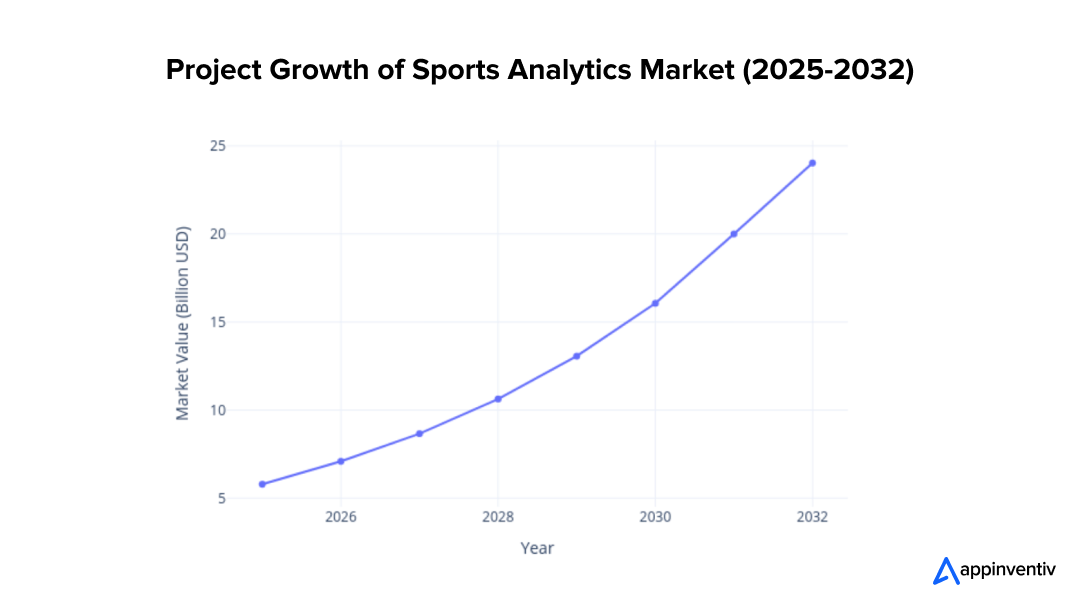
This sports analytics market insight demonstrates the value of a sports analytics app. It has taken center stage in the sports industry, allowing businesses to enhance their game strategies and performance.
Key Market Drivers
- Performance Optimization: Teams and athletes, from professional to amateur levels, use sports data analytics to enhance performance.
- Wearable Technology and AI: Devices like GPS trackers and AI-driven sports provide real-time insights.
- Digitalization and Internet Penetration: Increased connectivity fuels data collection and fan engagement.
- Esports and Fantasy Sports: These platforms rely heavily on sports data analysis for strategy and user engagement.
In this blog, we explore the transformative use cases of data analytics in sports, highlighting real-world examples and unpacking the costs and challenges of turning raw data into championship wins. Buckle up—this is where science meets sweat, and the results are nothing short of electrifying.
With 75% of pro teams using real-time stats to win, it’s time to level up. Turn numbers into victories and own the game!
Core Use Cases of Data Analytics in Sports
Data analysis in sports fundamentally reshapes both on-field performance and off-field business operations.
On-Field Performance Analytics: Maximizing Athletic Potential
At its core, sports performance analysis enables athletes and teams to achieve their peak performance.
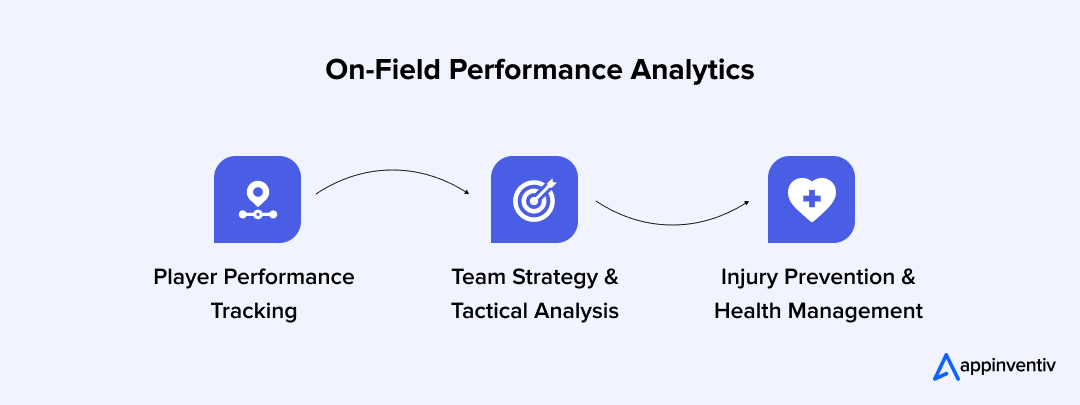
1. Player Performance Tracking: This involves granular monitoring of athletes through real-time biometric data (heart rate, speed, acceleration), detailed movement analysis, and biomechanical assessments. It also encompasses workload management to prevent fatigue and injury, as well as precise technical skill evaluation to identify areas for improvement.
Implementation: During practice, the sports analytics team typically uses GPS vests, heart rate monitors, and video analysis software. They then review the data to create personalized training programs, adjust game strategies, and make informed decisions regarding player readiness and substitutions.
Impact: This approach transforms coaching from an intuition-based to a data-driven approach, allowing for more precise athlete development and injury prevention.
2. Team Strategy & Tactical Analysis: Sports data analytics provides invaluable insights for optimizing game plans. It facilitates in-depth opponent analysis, detailed examination of formations and play patterns, and crucial real-time tactical adjustments during games. Video analysis is seamlessly integrated with performance data for a holistic view.
Implementation: The sports entity uses software platforms that combine GPS tracking, video feeds, and statistical analysis. Coaches can pull up opponent tendencies on tablets during halftime, adjust formations based on live performance data, and prepare players with specific tactical instructions backed by concrete evidence rather than assumptions.
Impact: This transforms game planning from guesswork into precise, evidence-based strategy.
3. Injury Prevention & Health Management: Proactive health management is a cornerstone of modern sports. Analytics in sports enables load management strategies to prevent overexertion, predictive injury modeling using historical data, and data-driven return-to-play protocols. Personalized recovery programs further enhance athlete well-being.
Implementation: The sports organization uses wearable devices to continuously monitor biomarkers, movement screening tools to assess injury risk, and integrated platforms that alert medical staff when athletes exceed safe thresholds. This allows immediate intervention before minor issues become major injuries.
Bonus Read: Essential Wearable Device App Features for Better Efficiency
Impact: The result is fewer injuries, shorter recovery times, and athletes who can maintain peak performance throughout longer careers.
Off-Field Business Analytics
Beyond the field, data analytics for sports teams is revolutionizing business models and fan engagement.
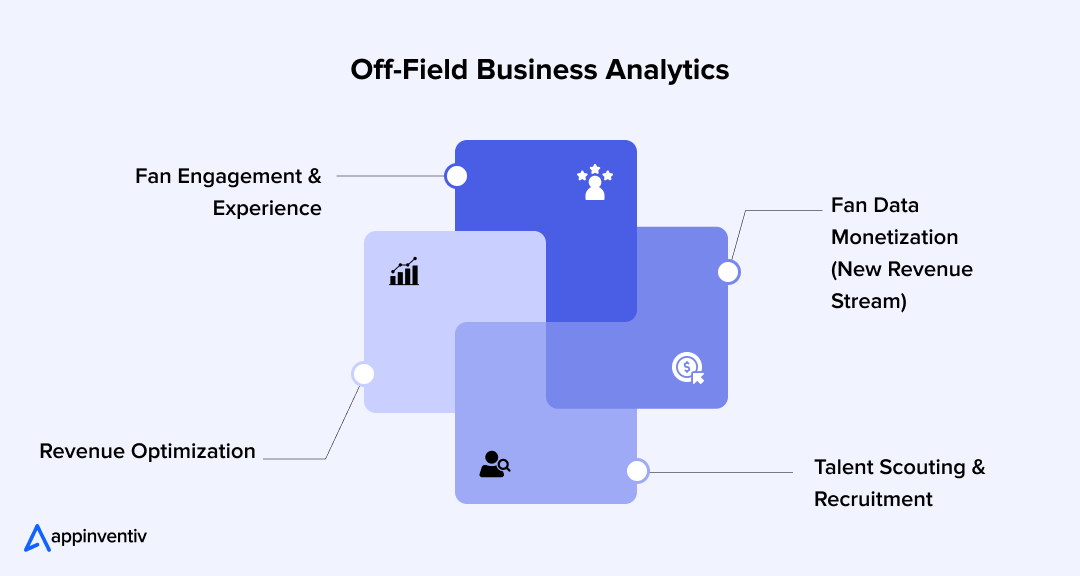
1. Fan Engagement & Experience: Sports analytics fosters deeper fan connections through personalized content delivery and marketing, social media sentiment analysis, and interactive experiences powered by real-time data. Enhanced broadcast analytics offers viewers richer insights, while emerging technologies like VR/AR and shared reality displays create truly immersive sports experiences.
Bonus Read: AR/VR Trends and Predictions For The Upcoming Years
Implementation: Fans use stadium apps to order food based on wait times, receive personalized route suggestions to avoid crowds, and access instant replays with advanced analytics.
Impact: This creates a seamless, data-driven experience that fosters a deeper emotional connection to the sport.
2. Fan Data Monetization (New Revenue Stream): A significant new revenue stream is emerging from fan data. Leagues and teams are building comprehensive fan databases, with models like the NFL’s boasting over 250 attributes per fan. Data clean rooms enable secure sharing with sponsors, while first and third-party fan insights drive lucrative brand partnerships. Personalized marketing and enhanced fan experiences are key outcomes, and audience insights strengthen media rights negotiations.
Implementation: Teams use mobile apps, social media monitoring, ticket purchasing data, and stadium Wi-Fi tracking to build comprehensive fan profiles, then monetize this intelligence through targeted advertising partnerships and premium data licensing deals with brands and media companies.
Impact: Fan data monetization transforms the sports business, enabling precise targeting for sponsorships and ads, boosting revenue, and strengthening media rights deals. Teams must strike a balance between profits and fan privacy to maintain trust while leveraging digital data.
3. Talent Scouting & Recruitment: Data science in sports is transforming how talent is identified and acquired. It leverages data-driven player evaluation metrics, sophisticated performance prediction models, and accurate market value assessment. This extends to optimizing youth development programs, ensuring a pipeline of future talent.
Bonus Guide: A Complete Guide on Data Science & Analytics for Businesses
Implementation: Teams use video analysis and performance databases to scout players globally, predictive models to guide draft selections, and tracking systems to monitor youth player development. Now, scouts can easily access data-backed hypotheses about specific players rather than relying solely on live observation.
Impact: This has democratized talent identification, allowing smaller organizations to compete with larger budgets through smarter, more informed decision-making.
4. Revenue Optimization: Sport Data analysis drives revenue optimization through dynamic ticket pricing based on demand forecasting, merchandise sales optimization, and robust sponsorship value assessment. It also aids in venue capacity and resource management. Crucially, data-driven sponsorship deals emerge where fan data becomes the primary value proposition.
Implementation: The sports analytics team uses integrated platforms that combine ticketing systems, point-of-sale data, and fan behavior analytics to create real-time revenue optimization engines that automatically adjust pricing, inventory, and marketing spend to maximize profitability per event.
Impact: Data analytics revolutionizes sports revenue by enabling real-time pricing optimization, inventory management, and effective sponsorships. This shifts sports businesses from static pricing to dynamic, analytics-driven revenue models.
Real-World Examples of Data Analytics in Sports
From the NBA’s hardwood courts to the lush pitches of global soccer and the storied diamonds of Major League Baseball, sports data analytics software development is reshaping the landscape of athletic performance.
By harnessing cutting-edge technologies and sophisticated metrics, such as the NBA’s Player Efficiency Rating, MLB’s Sabermetrics, and soccer’s Expected Goals (xG), teams are unlocking unprecedented insights into player performance, tactical formations, and real-time decision-making. These real-world data analytics applications enhance team strategies and redefine the essence of competition in professional leagues worldwide.
NBA Analytics Revolution
The NBA has adopted a sports analytics app development approach that utilizes optical system player-tracking technology. This has led to advanced metrics like Player Efficiency Rating (PER) and the ability to make real-time strategic adjustments based on data.
Implementation:
The NBA uses an optical tracking system that leverages multiple cameras placed in the catwalks in all 29 NBA arenas. The cameras receive and update data at 25 frames per second and are now powered by Sony’s Hawk-Eye optical tracking technology, which captures player and ball movement in real time in three dimensions.
Stats Perform introduced optical tracking to professional sports and the NBA, and the company is now driving the industry forward with the advancements in computer vision and active learning of SportVU 2.0. (ESPN Sports)
Impact:
This has enhanced the decision-making process. This tool captures transformative new statistics and insights, including shot probabilities, player health, sport performance analysis metrics, and defensive and off-the-ball metrics.
MLB’s Statistical Evolution
Regarding data analysis in sports, Major League Baseball (MLB) has played a pioneering role with the rise of Sabermetrics, enabling advanced pitching analytics and optimized defensive positioning. Player development throughout minor leagues is now heavily influenced by sports performance analysis.
Implementation:
MLB deployed Statcast, a tracking technology that allows for collecting and analyzing a massive amount of baseball data, in ways that were never possible in the past. Statcast encompasses pitch tracking, hit tracking, player tracking, and bat tracking for all Major League games.
Impact:
Statcast tracks and quantifies much of the action on the field. That applies to pitching (velocity, spin rate, spin direction, pitch movement), hitting (exit velocity, launch angle, batted ball distance), running (sprint speed, base-to-base times), and fielding (arm strength, catch probability, catcher pop time).
The Expected Outcome stats help to remove defense and ballpark from the equation to express the skill shown at the moment of batted ball contact.
Football/Soccer Analytics
The world’s most popular sport extensively utilizes sports analytics. Expected Goals (xG) and passing network analysis provide deeper insights into offensive and defensive efficacy. Player heat maps and movement patterns inform tactical formation analysis and player roles.
Implementation:
Backed by Qwinn AI capabilities, Expected goals (xG) consider up to 35 contextual factors, including location and angle, when determining an xG output. This provides fans with insight into the quality of every chance in a game and the likelihood of a goal being scored. (FBref)
Impact:
Expected Goals (xG) is calculated by applying a logistic regression model to hundreds of thousands of shots, with detailed Opta event data providing contextual information.
Cutting-Edge Technologies That Power the Future of Sports Analytics
The world of sports is undergoing a data-driven revolution, powered by a cutting-edge AI technology stack that transforms raw numbers into game-changing insights. From advanced sensors capturing every movement to cloud-based platforms crunching massive datasets in real time, the infrastructure of sports analytics is redefining how teams compete, coaches strategize, and fans experience the thrill of the game. The power of sports analytics is built upon the following sophisticated technology stack.
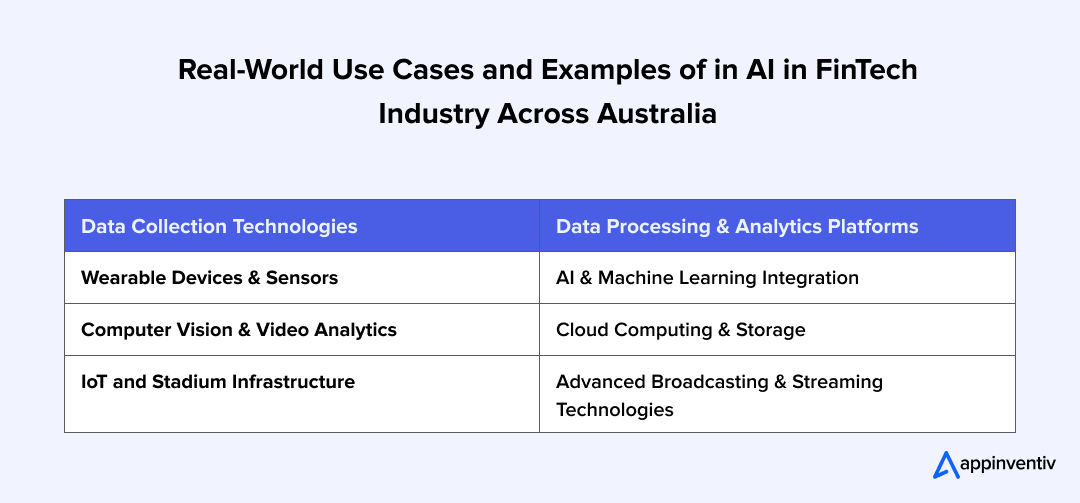
Data Collection Technologies
In the rapidly evolving landscape of sports technology, data collection systems are revolutionizing the way athletes train, compete, and interact with their environments. Together, these technologies generate vast datasets, unlocking a new era of performance optimization, strategic decision-making, and immersive fan engagement through sophisticated data processing and analytics.
- Wearable Devices & Sensors: These devices capture comprehensive athlete data through GPS tracking systems, accelerometers, and heart rate monitors. Smart clothing with embedded sensors provides continuous monitoring without disrupting performance. These devices generate massive datasets requiring sophisticated processing capabilities.
- Computer Vision & Video Analytics: The sports team utilizes multi-camera tracking systems for comprehensive movement analysis. Motion capture technology provides precise biomechanical data, while automated event detection identifies key game moments. 3D motion analysis provides a detailed assessment of technical skills.
- IoT and Stadium Infrastructure: IoT in sport creates connected venue ecosystems with environmental monitoring and fan engagement sensors. Smart equipment tracking optimizes resource management and provides valuable maintenance insights.
Data Processing & Analytics Platform
These platforms and technologies revolutionize how teams, fans, and organizations engage with the game. By harnessing the power of AI and machine learning, these platforms redefine the intersection of technology and sports, driving unparalleled performance, engagement, and entertainment.
1. AI & Machine Learning Integration: It enables predictive injury prevention and performance optimization modeling. Specifically, Generative AI personalizes fan content feeds and provides instant customer support. Machine learning algorithms analyze game footage while automated scouting systems identify talent.
2. Cloud Computing & Storage: It provides a scalable infrastructure for massive data processing requirements. Real-time analytics capabilities support in-game decision making, while data integration platforms combine multiple source inputs.
Bonus Read: An Ultimate Guide to Cloud Computing
3. Advanced Broadcasting & Streaming: These technologies create immersive viewing experiences with in-game betting integration and personalized advertising delivery.
Implementation Strategy: Steps to Getting Started with Sports Analytics
The world of sports has undergone a revolutionary transformation over the past decade, with data analytics becoming as crucial to success as physical training and tactical preparation. However, implementing a comprehensive sports analytics program can seem overwhelming for organizations beginning their data-driven journey.
The key lies not in attempting to revolutionize everything at once, but in developing a systematic, strategic approach that builds capability over time while delivering immediate value.
The Strategic Foundation: Assessment and Planning
Successful sports analytics implementation begins with a thorough understanding of your organization’s current state and future goals.
- Current Capability Audit: The first step involves conducting an honest assessment of your existing analytical capabilities. This consists in examining not only the technology and data you currently access but also the human resources and organizational culture that will ultimately determine your success.
- Objective Definition and KPI Establishment: Clear objectives serve as the north star for any analytics initiative. Rather than pursuing analytics for its own sake, successful organizations identify specific problems they want to solve or opportunities they want to capture.
- Technology Needs Assessment: The most advanced technology isn’t always the best choice for organizations starting their analytics journey. A thorough needs assessment considers current requirements and anticipated future growth. This includes evaluating data storage needs, processing capabilities, user interface requirements, and integration with existing systems.
- Budget and Timeline Planning
Realistic financial and temporal expectations are crucial for implementing sustainable analytics. Organizations must plan for ongoing costs, including software licenses, hardware infrastructure, staff training, and potentially new personnel.
Timeline planning should account for the learning curve associated with new technologies and analytical approaches. Setting overly aggressive timelines often leads to frustration and can undermine support for analytics initiatives within the organization.
Building Momentum Through Pilot Programs
Once the strategic foundation is established, the most effective approach to implementation involves starting small with carefully designed pilot programs that can demonstrate value while building organizational capability.
- Small-Scale Testing and Validation: Pilot programs allow organizations to test analytical approaches in controlled environments before committing to larger-scale implementations. This might involve focusing on a single team, a specific aspect of performance, or a particular period.
- Staff Training and Change Management: Comprehensive training programs ensure that coaches, administrators, and other staff members can effectively interpret and apply analytical insights in their daily work. Change management goes beyond technical training to address the cultural shifts required for successful analytics adoption.
- Incremental Expansion Planning: Successful pilot programs naturally create opportunities for expansion. However, this growth should be planned and systematic rather than haphazard. Each expansion phase should build on previous successes while addressing new challenges or opportunities.
Choosing the Right Technology Partners
The selection of technology partners and vendors can significantly impact the success of sports analytics initiatives. Making the right choices requires careful evaluation of multiple factors beyond technical capabilities.
Vendor Evaluation Criteria: Effective vendor evaluation considers current needs and future growth potential. Key criteria should include the vendor’s track record in sports analytics, the comprehensiveness of their solution, ease of use, and alignment with organizational objectives.
Integration Capabilities Assessment: Modern sports organizations utilize multiple systems for various functions, including player management databases, financial systems, and video analysis platforms. They opt for analytical solutions that can seamlessly integrate with existing systems and provide significantly more value than standalone tools.
Launch a dope pilot, grab elite tech, and boost your team’s game. Consult our data pros to supercharge your sports analytics.
Cost of Developing & Implementing Data Analytics in Sports: A Detailed Breakdown
Developing data analytics capabilities in sports is a significant investment, but one that can yield substantial returns in performance optimization, injury prevention, player recruitment, fan engagement, and revenue generation. The cost can vary widely depending on the organization’s scope, complexity, and specific needs (e.g., a professional sports team, a league, a sports agency, or a media company).
Giving an average cost is challenging due to the vast differences in project scale. However, a rough estimate could be:
- Basic Analytics Setup (Small Team/Initial Phase): $40,000 – $200,000 (initial setup) + $50,000 – $150,000/year (ongoing). This may involve leveraging existing tools and a small, dedicated team of outsourcing certain functions.
- Mid-Range Analytics Platform (Professional Team/League Department): $200,000 – $1,000,000+ (initial setup) + $150,000 – $500,000+/year (ongoing). This would involve more custom development, extensive data sources, and a dedicated internal team.
- Advanced/Enterprise-Level Analytics (Major League/Large Organization): $1,000,000 – $5,000,000+ (initial setup) + $500,000 – $2,000,000+/year (ongoing). This would include cutting-edge AI/ML, real-time analytics across multiple data streams, and a large, multidisciplinary team.
Here’s a detailed breakdown of the costs involved:
| Functional Aspects | Cost Analysis |
| Initial Planning & Consulting: Requirements Analysis & Discovery, Feasibility Study & Technology Stack Selection, Data Strategy & Roadmap Development, and Vendor/Consultant Fees. | $10,000 – $50,000+ Approx. |
| Data Acquisition & Management: Data Collection Infrastructure (wearable, sensors, GPS trackers), Data Sources & Subscriptions, Cloud Data Warehousing, Data Cleaning & Preprocessing, and Data Governance & Security. | $75,000 – $200,000+ Approx. |
| UI/UX Prototyping: Designing intuitive dashboards and user interfaces | $20,000 – $50,000 Approx. |
| Platform Development & Integration: Custom Software Development (Backend and Frontend Development), AI/Machine Learning Integration, and Integration with Existing Systems. | $50,000 – $200,000+ Approx. |
| Testing, Deployment & Maintenance: AI-powered Quality Assurance (QA) & Testing, Deployment, Ongoing Maintenance & Support, and Scalability & Optimization. | $10,000 – $50,000+ annually Approx. |
| Miscellaneous & Hidden Costs: Change Management & Adoption, Legal & Compliant AI Product, Hardware Depreciation & Upgrades, and Consulting & Advisory Services. | |
Challenges For Data Analytics in Sports & Their Solutions
Implementing sports analytics is no slam dunk—it’s a multidimensional challenge that tests technical prowess, organizational agility, and ethical integrity. Sports organizations face numerous obstacles, including wrestling with fragmented data and scaling infrastructure, as well as overcoming cultural resistance and navigating stringent privacy regulations.
Let’s dive into the heart of these challenges and unveil strategies to conquer them and unlock the full potential of analytics to revolutionize performance on and off the field.
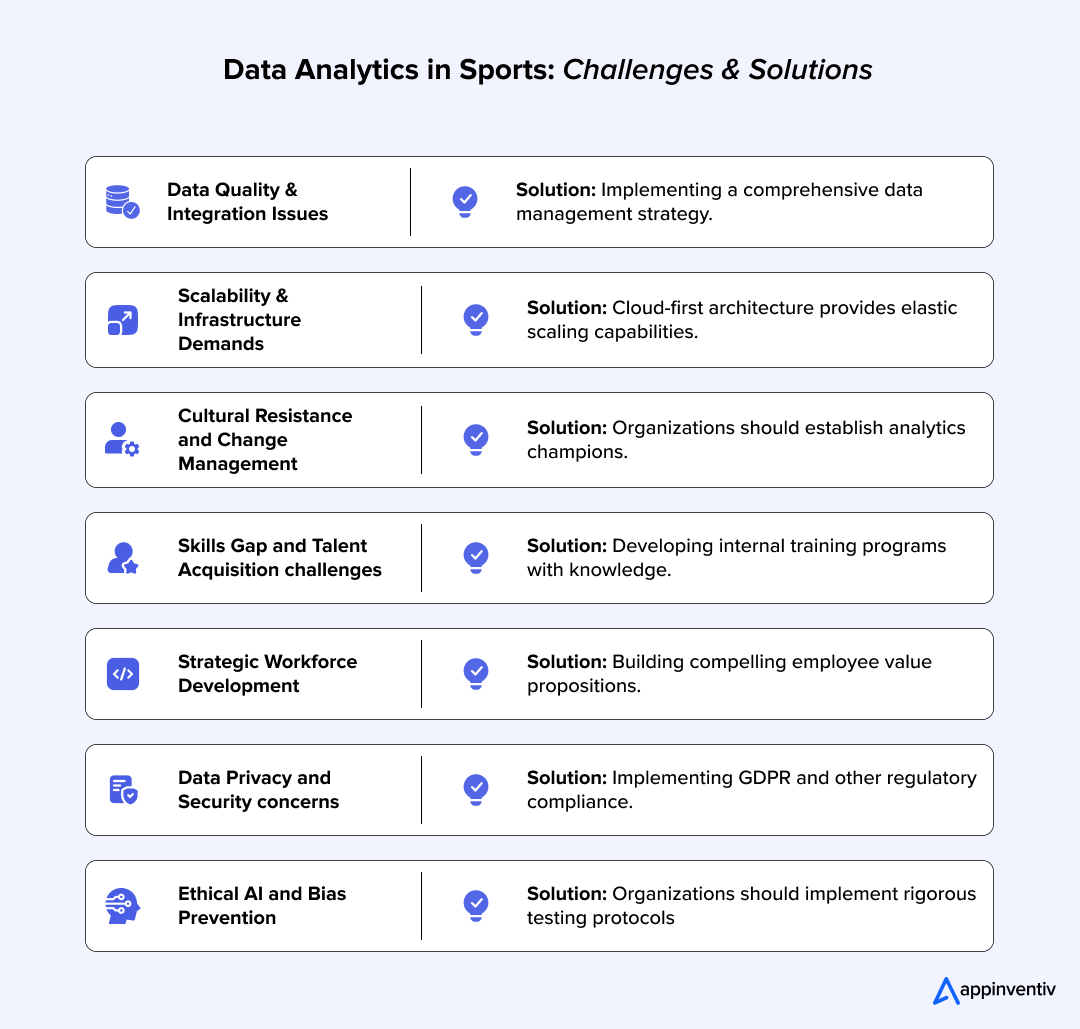
Technical Challenges
1. Data Quality and Integration Issues: These present significant obstacles, as sports data often exist in fragmented and inconsistent formats. Multiple data source integration creates complexity, while real-time processing demands require robust infrastructure.
Solution: Implementing a comprehensive data management strategy addresses fragmentation through establishing standardized data formats and protocols across all sources. Organizations should deploy Extract, Transform, Load (ETL) pipelines with automated data validation rules to ensure consistency.
2. Scalability and Infrastructure Demands: This includes high computational requirements and storage limitations. System reliability needs and technology upgrade cycles require ongoing investment and planning.
Solution: Cloud-first architecture provides elastic scaling capabilities that automatically adjust to computational demands during peak usage periods. Implementing microservices architecture allows individual system components to scale independently, optimizing resource allocation.
Organizational Challenges
1. Cultural Resistance and Change Management: It occurs when traditional methodologies conflict with data-driven approaches. Coaches may hesitate to trust analytics over experience, requiring careful change management strategies.
Solution: Organizations should establish analytics champions within the coaching staff who can bridge traditional knowledge with data insights. Creating collaborative workshops where coaches and analysts work together on specific problems builds trust and understanding.
2. Skills Gap and Talent Acquisition challenges: These include limited sports analytics app development expertise and high competition for qualified professionals. Training programs must bridge the gap between sports knowledge and technical skills.
Solution: Developing internal training programs that combine sports domain knowledge with technical skills creates a sustainable talent pipeline.
3. Strategic Workforce Development: It becomes critical as sports organizations compete with tech companies for talent. Purpose-driven initiatives and winning cultures help retain valuable employees whose replacement costs often exceed multiple times their annual salaries.
Solution: Building compelling employee value propositions that emphasize the unique intersection of sports passion and cutting-edge technology helps compete with tech companies for talent.
Regulatory and Ethical Challenges
1. Data Privacy and Security concerns: GDPR compliance and player data rights protection are required. Fan data protection regulations add complexity, while ethical considerations guide implementation decisions.
Solution: Implementing privacy-by-design principles ensures GDPR and other regulatory compliance from the ground up rather than as an afterthought. Organizations should establish clear data governance frameworks that define policies for collecting, using, and retaining all data types.
Bonus Read: GDPR Software Compliance – A Comprehensive Checklist
1. Ethical AI and Bias Prevention: It demands transparent algorithm development and fair representation in datasets. Organizations must carefully handle AI implementation to avoid bias and ensure fairness.
Solution: Organizations should implement rigorous testing protocols that evaluate algorithms across different demographic groups and playing styles to ensure fair treatment.
Future Outlook: Emerging Trends in Sports Analytics
The convergence of next-generation technologies, such as quantum computing, 5G, edge computing, and blockchain, propels sports analytics into a new era of unprecedented precision and possibility. With these technologies, connectivity becomes seamless, and fan engagement transcends physical boundaries. Sports analytics is poised to unlock transformative opportunities that redefine competition and connection in the global sports landscape.
Next-Generation Technologies
- Quantum Computing Applications: While still nascent, quantum computing holds immense potential for sports analytics. It could enable advanced simulation capabilities, solve complex optimization problems, enhance predictive modeling, and vastly improve massive data processing.
- 5G and Edge Computing: The rollout of 5G connectivity will enable real-time processing of sports data, reducing latency for live analytics and enhancing mobile experiences. Edge computing for enterprises will bring processing closer to the data source, improving efficiency and response times for IoT devices.
- Blockchain Integration: Blockchain could revolutionize player data ownership and rights management, create transparent performance records, and facilitate smart contracts for athlete compensation. It also has potential for innovative fan engagement and collectibles.
Evolving Application Areas
1. Personalized Fan Experiences: The future will see even more sophisticated AI-powered personalized content and interactive experiences. Customized viewing experiences, deeper social media integration, and virtual attendance capabilities will redefine fan engagement. Immersive sports venues with large-scale displays and virtual reality (VR) experiences will become increasingly commonplace.
2. Sports Betting Analytics: The sports betting segment is projected to register the highest CAGR within the broader sports industry. Sports data analytics software development will be crucial in real-time odds calculation, risk assessment, fraud detection, and creating more engaging betting experiences.
Bonus Read: Your Handy Guide on Sports Betting App Development
3. Next-Generation Sports Experiences: The boundaries between physical and digital sports are blurring. Hybrid physical-digital venues, exemplified by the TGL golf model, offer new ways to consume sports.
Appinventiv: Your Partner in Sports Data Analytics Software Excellence
As a leading data analytics consulting company, Appinventiv brings comprehensive expertise in transforming sports organizations through data-driven solutions. As a leading data science consulting company, our bespoke data analytics services help you convert your data into powerful insights that can offer your business the required edge in the competitive digital landscape.
We offer a comprehensive suite of services and expertise to help sports organizations harness the power of their data:
- Strategic Data Analytics Consulting: Our strategic data analytics consultants possess deep domain expertise across the full data stack, resolving business challenges and optimizing data science in sports projects for long-term success.
- Analytics as a Service (AaaS): Our AaaS offering provides scalable and customized data analytics solutions that are tailored to meet your specific needs. By leveraging cloud-based capabilities, we allow businesses to perform complex sport data analysis without extensive on-premise infrastructure, ensuring real-time data processing, seamless integration, and insightful reporting.
- Predictive Analytics and AI Integration: As a leading provider of predictive analytics services, Appinventiv helps unlock the full potential of data assets. We analyze historical data to identify patterns, forecast future trends, and detect risks.
- Robust and Scalable Analytics Platforms: We design, implement, and maintain comprehensive analytics ecosystems tailored to specific business needs.
- Industry-Specific Expertise: We specialize in the sports industry, understanding its unique requirements for immersive and engaging UI/UX. We leverage our technological expertise to help leaders launch or scale sports businesses.
Partner now with Appinventiv to streamline operations, enhance player performance, optimize business strategies, and deepen fan engagement, ultimately thriving in a data-driven sporting landscape.
FAQs
Q. What is sports analytics?
A. Data analytics in the sports industry illustrate the collection, analysis, and interpretation of data related to different aspects of sports, used to extract significant insights to improve decision-making, game performance, and player development.
Q. How data analytics transforms game strategies in sports?
A. Data analytics transforms game strategies by providing insights into player performance, opponent tendencies, and game patterns, enabling coaches to optimize tactics, make real-time decisions, and tailor strategies to exploit weaknesses and enhance strengths.
Q. What role does data analytics play in modern sports?
A. Data analytics in modern sports drives performance optimization, injury prevention, and strategic planning by analyzing player stats, biometrics, and game data to inform coaching decisions, improve training, and enhance fan engagement.
Q. What are the benefits of data analytics in sports?
A. The benefits of data analytics in sports are numerous and impactful:
- Enhanced Player Performance: Optimizes training, identifies strengths/weaknesses, and helps in strategic decision-making.
- Injury Prevention: Monitors player health and workload to reduce the risk of injuries.
- Smarter Recruitment & Scouting: Identifies top talent objectively and efficiently.
- Improved Game Strategy: Analyzes opponent tendencies and informs tactical adjustments.
- Increased Fan Engagement: Personalizes experiences and content for deeper fan connection.
- Optimized Business Operations: Helps with ticket pricing, merchandise sales, and sponsorship deals for revenue maximization.
Q. How can sports analytics data transform your team’s performance?
A. Sports analytics data transforms team performance by identifying key performance indicators, optimizing player roles, predicting opponent moves, and personalizing training plans, leading to improved efficiency, decision-making, and win rates.
Q. What algorithms are used in sports analytics?
A. Common algorithms in sports analytics include machine learning (e.g., regression, clustering, neural networks), decision trees, Bayesian models, and predictive modeling for performance forecasting, injury risk assessment, and game strategy optimization.
Q. What are the Application of Sports Analytics in different sports?
A. Sports analytics powers performance, strategy, and fan engagement across various sports:
- Football (Soccer): Optimizes tactics, player performance (xG, passes), and injury prevention.
- Basketball: Analyzes player movement, shots, and fatigue; aids recruitment and coaching.
- Baseball: “Moneyball” pioneer; dissects pitching, batting, defense, and recruitment.
- Cricket: Revolutionizes player evaluation, recruitment, and in-match strategy.
- American Football (NFL): Crucial for player assessment, game planning, and strategy.
- Hockey (NHL): Evaluates player performance and shapes strategies via shot attempts and zone data.
- Individual Sports (Golf, Tennis): Improves technique, prevents injuries, and aids calls (Hawkeye).
- Motorsport (F1): Maximizes racing strategy, car setup, and pit stops with real-time data.
Analytics drives peak performance, smart strategies, and enriched fan experiences.
Q. What is the cost to implement data analytics in sports?
A. Costs for sports analytics implementation vary widely, ranging from $40,000 – $200,000, depending on tools (e.g., software, sensors), staff expertise, and infrastructure. Basic setups may be cheaper, while elite systems require significant investment. For precise pricing, consult providers like Catapult or STATS Perform.
Q: What is the role of sports analytics for injury prevention?
A. Sports analytics plays a crucial role in injury prevention. It uses data to identify risk factors, predict potential injuries, and optimize training loads. It analyzes athlete biomechanics, workload, recovery patterns, and historical injury data to develop personalized training programs and interventions. This helps coaches and medical staff proactively manage athlete health, reduce strain, and minimize the likelihood of injuries.


- In just 2 mins you will get a response
- Your idea is 100% protected by our Non Disclosure Agreement.
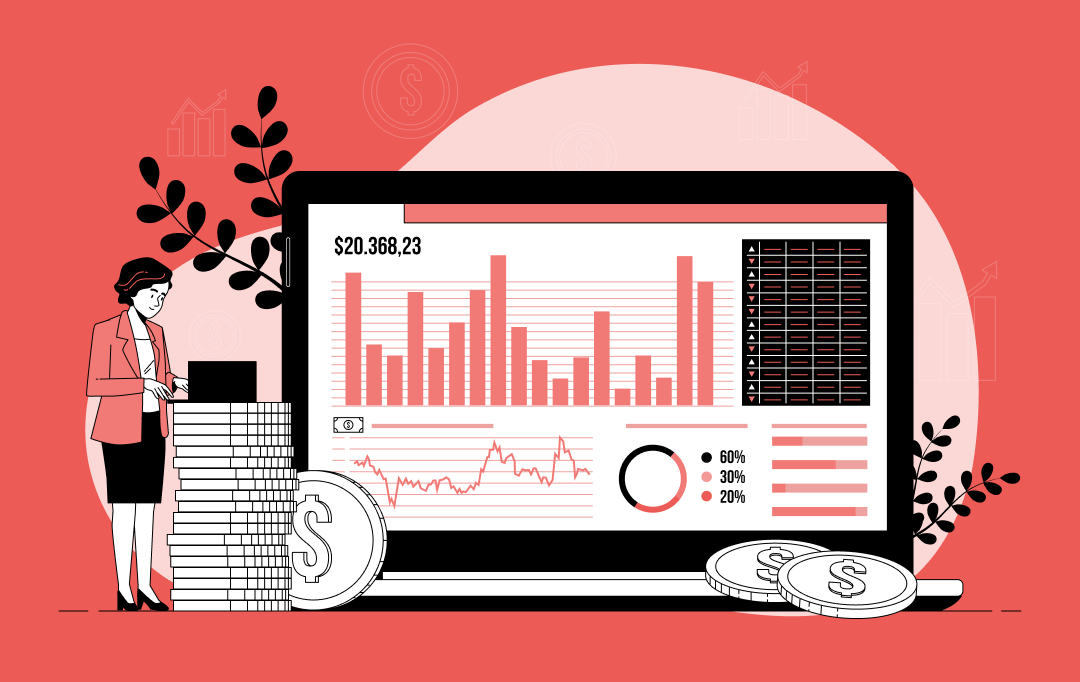
Unleashing the Role of Data Analytics in Driving Smarter Banking Decisions
The use of data analytics in banking is transforming how this data is interpreted and applied. Banks are using this data to make decisions that matter—fraud checks, loan approvals, or marketing campaigns. The focus has shifted: from storing data to using it smartly, and from pushing products to understanding people—being customer-centric. This shift is also…

10 Use Cases and Examples of How Pharmacy Data Analytics is Transforming Operations and CX
Data has become the currency of modern business, and the pharmacy sector is no exception. From inventory optimization to regulatory compliance, pharmacies today face many challenges that demand precision and agility. Well, pharma data analytics is solving all these conundrums as the main lead, a transformative approach that now empowers businesses to get actionable insights…

10 Use Cases and Benefits of Predictive Analytics in Manufacturing
Are you trying to stay in today’s manufacturing game with that old-school data analytics approach? Not gonna happen, buddy! Think about that old-school grind: manufacturing plant techies had to hustle around, scribbling notes and logging maintenance records by hand. All that manual intervention and hassle led to nothing more than messy data and bad calls.…

















